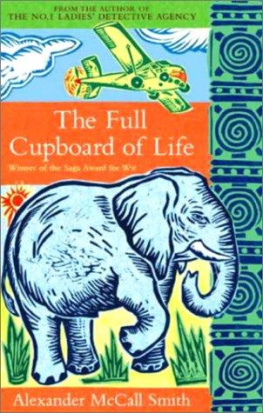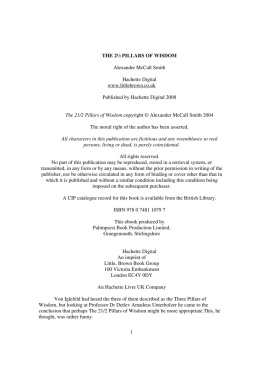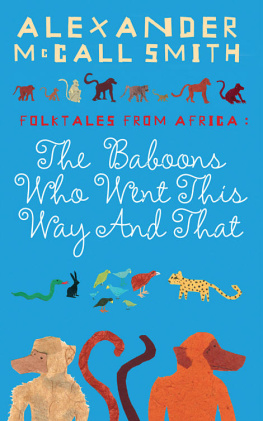Alexander Mccall Smith - The Perils of Morning Coffee
Here you can read online Alexander Mccall Smith - The Perils of Morning Coffee full text of the book (entire story) in english for free. Download pdf and epub, get meaning, cover and reviews about this ebook. year: 2011, publisher: Pantheon, genre: Prose. Description of the work, (preface) as well as reviews are available. Best literature library LitArk.com created for fans of good reading and offers a wide selection of genres:
Romance novel
Science fiction
Adventure
Detective
Science
History
Home and family
Prose
Art
Politics
Computer
Non-fiction
Religion
Business
Children
Humor
Choose a favorite category and find really read worthwhile books. Enjoy immersion in the world of imagination, feel the emotions of the characters or learn something new for yourself, make an fascinating discovery.

- Book:The Perils of Morning Coffee
- Author:
- Publisher:Pantheon
- Genre:
- Year:2011
- Rating:5 / 5
- Favourites:Add to favourites
- Your mark:
- 100
- 1
- 2
- 3
- 4
- 5
The Perils of Morning Coffee: summary, description and annotation
We offer to read an annotation, description, summary or preface (depends on what the author of the book "The Perils of Morning Coffee" wrote himself). If you haven't found the necessary information about the book — write in the comments, we will try to find it.
Alexander Mccall Smith: author's other books
Who wrote The Perils of Morning Coffee? Find out the surname, the name of the author of the book and a list of all author's works by series.
The Perils of Morning Coffee — read online for free the complete book (whole text) full work
Below is the text of the book, divided by pages. System saving the place of the last page read, allows you to conveniently read the book "The Perils of Morning Coffee" online for free, without having to search again every time where you left off. Put a bookmark, and you can go to the page where you finished reading at any time.
Font size:
Interval:
Bookmark:


This is a work of fiction. Names, characters, places, and incidents either are the product of the authors imagination or are used fictitiously. Any resemblance to actual persons, living or dead, events, or locales is entirely coincidental.
Copyright 2011 by Alexander McCall Smith
All rights reserved. Published in the United States by Pantheon Books, a division of Random House, Inc., New York. Originally published in Great Britain by Little, Brown, an imprint of Little, Brown Book Group, a Hachette U.K. Company, London.
Library of Congress Cataloging-in-Publication Data
McCall Smith, Alexander, [date]
The perils of morning coffee : an Isabel Dalhousie ebook original story / Alexander McCall
Smith. 1st U.S. ed.
p. cm.
eISBN: 978-0-307-90751-6
1. Dalhousie, Isabel (Fictitious character)Fiction. 2. Women philosophersFiction. 3.
Edinburgh (Scotland)Fiction. I. Title.
PR6063.C326P47 2011
823.914dc23
2011035708
www.pantheonbooks.com
Cover design by Linda Huang
v3.1
ISABEL DALHOUSIE SAW BROTHER FOX that morning at eleven minutes past four. She was not one to take much notice of such detailsshe felt it was usually a matter of little importance to know exactly what time it was, unless, of course, one was a railway company, or an airline, for whom concern about punctuality was entirely understandable and, on the whole, to be encouraged. She wore a watcha small gold one that bore the reassuring message Entirely made in Switzerland, and had belonged to her motherher sainted American mother, as she thought of herbut she only glanced at it a few times a day: when Charlie had to go to playgroup, for example, or when he had to be picked up again in the early afternoon. For the most part, she was content to have only a very rough idea of the time, and had considerable admiration for those who measured their lives against the seasons, as farmers do, or the tides, as fishermen must. Time, she felt, made quite enough claims on us, without our conniving in its relentless tyranny.
She knew that it was eleven minutes past four because that was what showed on the clock built into the cooker in her kitchen. This clock, which had a glowing display, was unfailingly precise, declaring the hour, the minute and the second in pulsing electric numerals. Like those disquieting clocks that remind us of the burgeoning of the national debtthousands upon thousands being added with each passing secondthis display could provoke uncomfortable thoughts. The number of seconds each of us has in this life is, after all, finite, and every one that ticks past brings us closer to the point where we shall have only a few moments left. Some dwell on such thoughts with the equanimity that comes from acceptancefrom dust we come and to dust we return; others would prefer not to be reminded of mortality. There is no point, they feel, in thinking about the inevitableprecisely because it is inevitable. On the other hand, Isabel thought that carpe diemseize the daywas probably one of the more helpful mottoes by which to lead ones life, and if a glance at the time served to remind us of it, then that was no bad thing.
Isabel and Jamie rarely paid any attention to this cooker clock, and would not have been aware of its accuracy had Isabels housekeeper, Grace, not remarked that she had checked it against the time signal on BBC Radio and had discovered that it was absolutely accurate, down to the second.
Then I certainly wont argue with the cooker, said Isabel. Or indeed with any domestic appliances.
Grace had glanced at her. Her employers remarks were often somewhat difficult to fathom, and this one, she thought, was typical. Why should anybody want to argue with a domestic appliancewith a vacuum cleaner, for instance? Grace would never argue with things like that; if they misbehaved, she kicked them.
Isabel had once observed this and had commented on it to Jamie. I saw her kick the vacuum cleaner this morning. It was stuttering a bitI think it was blockedand she kicked it quite hard.
And? asked Jamie.
It started going again.
Well, there you are, said Jamie.
But one should be very careful about kicking things, said Isabel. One cant go through life lashing out at things that dont work.
Possibly not, said Jamie, thinking of one of his pupils, who had hit his bassoon in frustration and broken one of the keys.
Eleven minutes past four: she noticed the red flashing display and immediately glanced out of the window. It was light outsidethe summer solstice was only a matter of days awayand the sun was already on the tree-tops. She liked the light of morning, with its crispness and, well, its innocence. The light of afternoon and evening was a used light, a light that had no intentions of encouraging or revealing anything new; a light under which all sorts of minor sins could be practised without detection.
At first Brother Fox was not there, and then he was. He appeared at the top of the stone garden wall that ran along the edge of the garden, a highway for the cats of the neighbourhood and for Brother Fox himself. He took a few steps forward and stopped, sniffed at the air, and then continued his journey. Isabel, now standing at the kitchen window, was motionless. Brother Fox, she had decided, did not see her if she remained still, and there was glass between the two of them. Perhaps he saw his own reflection, or the sky mirrored in the window; perhaps he saw shapes and shadows that meant nothing to him. Certainly now he was looking at her directly, it seemed, and was unperturbed. Then, as if remembering some commitment, he continued along the top of the wall before leaping down into the next-door garden.
The encounter with Brother Fox was brief, but it meant that Isabel would now be unable to go directly back to bed. Sleep might return after a brief period of wakefulness but tended to be elusive after a few minutes, and particularly so after a few minutes in which something had happened. Her mind was now active, engaged with thoughts of what Brother Fox might be up to. He led a life to which she was only fleetingly admittedthose times when she saw him emerging cautiously from beneath the rhododendron bushes, sniffing at the air for signs of danger, trotting across an expanse of lawn, disappearing as quickly and mysteriously as he had appeared. He had his plans, of course, but what they were was his business and remained quite opaque to Isabel. He was concerned with survival, she thought, as were we all, but somehow she felt that to reduce his life to that and that alone was to demean it, to undervalue it. If he felt fear, as he clearly did, then might he not feel other emotions too? Did he experience love and tenderness when he slept at night with his mate and their brood of cubs?
She had woken up feeling hungrya light dinner the previous evening was responsible for thatand now, with a glass of milk in her hand, she made her way into her study. She knew that if she started to work she would not get back to sleep at all and would feel the consequences for the rest of the day. There was plenty for her to do: a pile of manuscripts sat on one corner of her desk, while on another corner there perched a tower of books sent in for review. She decided that she would attend to neither of these. She switched on her computer and watched the screen resolve; there were several new emailspatient electronic sorting rooms somewhere dispatched these while their senders and recipients slumbered. Two were routine, but a third announced:
Font size:
Interval:
Bookmark:
Similar books «The Perils of Morning Coffee»
Look at similar books to The Perils of Morning Coffee. We have selected literature similar in name and meaning in the hope of providing readers with more options to find new, interesting, not yet read works.
Discussion, reviews of the book The Perils of Morning Coffee and just readers' own opinions. Leave your comments, write what you think about the work, its meaning or the main characters. Specify what exactly you liked and what you didn't like, and why you think so.









